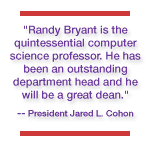|
|
||||
|
|
Randal Bryant Appointed New Dean of Top-Ranked School of Computer Science
Bryant, a 20-year member of the SCS faculty, has achieved wide recognition in academia and industry for developing computer-aided design tools that simulate and verify digital circuits, and for his research in symbolic manipulation and parallel computation. Last year Bryant was elected to the prestigious National Academy of Engineering for pioneering new abstractions for logic circuit simulation, especially the switch-level model for transistor circuits. Bryant's grandfather, William Everitt, former dean of engineering at the University of Illinois, was a founder of the National Academy of Engineering, making him the first grandson of a member to be inducted into the academy.
"Randy Bryant is the quintessential computer science professor," said Carnegie Mellon President Jared L. Cohon. "He has done outstanding research that many companies depend upon to verify the basic soundness of their computer systems. He is also known for excellence in teaching and for creating exciting new courses of study for undergraduate students in computer science. He has been an outstanding department head and he will be a great dean."
Binary decision diagrams are a tool that has enabled breakthroughs in the formal verification of hardware and software systems, including the widely acclaimed symbolic model checking, developed at Carnegie Mellon by graduate student Ken McMillan and his advisor, Edmund Clarke. Bryant is co-author of a best-selling textbook that, for the first time, offers a core text that provides an integrated view of the hardware, software and networks that underlie computer systems. The book, "Computer Systems: A Programmer's Perspective," written in conjunction with SCS colleague David O'Hallaron, was published in 2002 by Prentice Hall. To date, more than 63 colleges and universities in the U.S. and another 15 abroad are using the book in their basic computer curricula. Bryant earned a bachelor's degree in applied mathematics from the University of Michigan in 1973. He received a doctor's degree in electrical engineering and computer science from the Massachusetts Institute of Technology in 1981. He spent three years as an assistant professor of computer science at the California Institute of Technology before coming to Carnegie Mellon as an assistant professor in 1984. Bryant became an associate professor of computer science in 1987 and a full professor in 1990. He was named head of the Computer Science Department in 1999. He also holds a courtesy position in Carnegie Mellon's Electrical and Computer Engineering Department. Bryant is a Fellow of the Institute of Electrical and Electronics Engineers (IEEE) and the Association for Computing Machinery (ACM). He has received several awards from the Semiconductor Research Corp., including inventor recognition awards in 1989 and 1990, plus a technical excellence award shared with Carnegie Mellon colleagues in 1996. He is also a co-recipient of ACM's Kanellakis Theory and Practice Award for his contributions to the development of symbolic model checking. The Kanellakis award recognizes theoretical work in computer science that ultimately has an impact on the commercial world. He has received a number of best paper awards, including the 1989 IEEE Baker Prize, awarded to the single best paper among the thousands published each year across the entire IEEE. He received Carnegie Mellon's Newell Medal for Research Excellence in 1998. During his career Bryant has consulted for numerous companies, including Hewlett-Packard Corp., IBM and Fujitsu. He also serves on the technical advisory boards of several companies. Bryant is an avid athlete. Over the years, he has competed as a runner, speed skater, rower and triathlete. Most recently he has been rowing on Pittsburgh's rivers. As a member of the Steel City Rowing Club, he has competed three times in the "Head of the Ohio."
Anne Watzman
|
||
|
Carnegie Mellon Home |
||||
 Randal E. Bryant, head of the Computer Science Department, has been named dean of Carnegie Mellon's top-ranked
Randal E. Bryant, head of the Computer Science Department, has been named dean of Carnegie Mellon's top-ranked  In research Bryant is best known for developing switch-level chip simulation and ordered binary decision diagrams (BDDs). The MOSSIM simulator was the first tool that could efficiently model the logical behavior of very large-scale integrated (VLSI) circuits. Intel Corp. used the program for more than a decade in developing several generations of their microprocessors. Versions of the COSMOS simulator, which Bryant developed to succeed MOSSIM, are still being used at Intel and other companies.
In research Bryant is best known for developing switch-level chip simulation and ordered binary decision diagrams (BDDs). The MOSSIM simulator was the first tool that could efficiently model the logical behavior of very large-scale integrated (VLSI) circuits. Intel Corp. used the program for more than a decade in developing several generations of their microprocessors. Versions of the COSMOS simulator, which Bryant developed to succeed MOSSIM, are still being used at Intel and other companies.